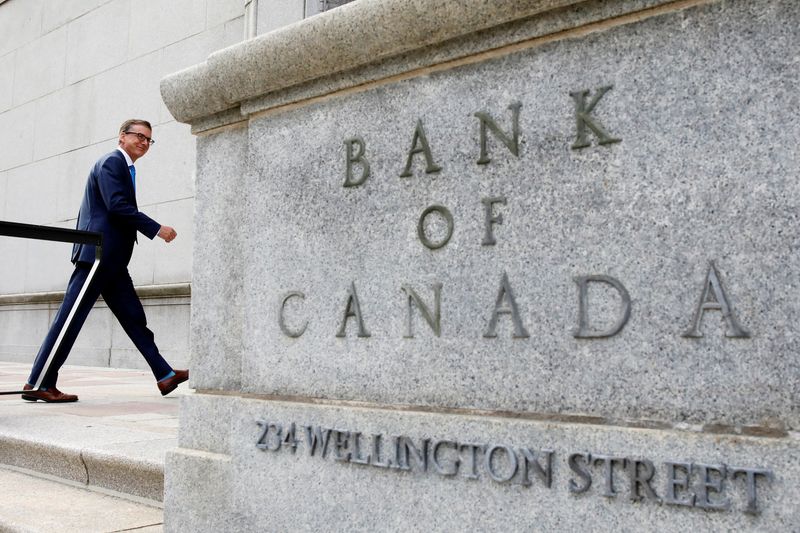By Julie Gordon and David Ljunggren
OTTAWA (Reuters) - The Bank of Canada hiked interest rates to their highest level in 14 years on Wednesday, as expected, and signaled its most aggressive tightening campaign in decades was not yet done as it battles to tame inflation.
The central bank, in a regular rate decision, hiked its policy rate to 3.25% from 2.50%, matching analyst forecasts and hitting a level not seen since April 2008. Rates are now above the BoC's neutral range, meaning that for the first time in about two decades monetary policy is likely to restrict growth.
"Given the outlook for inflation, the Governing Council still judges the policy interest rate will need to rise further," the central bank said in a statement after delivering its fourth consecutive outsized hike. "As the effects of tighter monetary policy work through the economy, we will be assessing how much higher interest rates need to go to return inflation to target."
The Bank of Canada leads its advanced-economy peers in policy tightening, having raised its policy rate by 300 basis points since March from a record low 0.25%, and it does not yet appear to be done.
"It does feel as though the bank is preparing the market for the possibility that rates will need to keep moving higher for more than one or two more meetings," said Andrew Kelvin, chief Canada strategist at TD Securities.
"I think they are trying to keep as many options as open as possible," he added.
The Bank of Canada, like many of its peers, faces intense criticism for downplaying hot inflation as "transitory" last year and not acting swiftly enough as price increases gathered steam.
The front-runner to lead Canada's opposition Conservatives, Pierre Poilievre, has promised to fire central bank Governor Tiff Macklem if he's elected prime minister and to replace him with someone "who will fight inflation."
Canadian Finance Minister Chrystia Freeland defended the central bank to reporters on Wednesday, saying it had the mandate, tools and experience to tackle the price gain problem.
SOARING PRICES
Inflation eased to 7.6% in July from 8.1% in June, but the decline was due to a drop in gasoline prices, with the core measures continuing to move higher, the central bank said.
"Surveys suggest that short-term (inflation) expectations remain high. The longer this continues, the greater the risk that elevated inflation becomes entrenched," the central bank said.
Money markets are betting on two more quarter-percentage-point increases this year to lift the policy rate to 3.75% in December.
Economists noted the possibility of a 50-basis-point hike in October followed by a standard 25-basis-point increase in December, opening the door to a policy rate of 4.00% by the end of the year, though much will hinge on the path of inflation and employment over the coming months.

"There's a fairly high risk that they hike rates at each of the next two meetings," said Doug Porter, chief economist at BMO Capital Markets. "We'll have to see whether those are just small hikes or larger, and I think a lot of that will depend on what happens to headline and core inflation in the next few months."
The Canadian dollar was trading 0.1% higher, at 1.3145 to the greenback, or 76.07 U.S. cents, after touching its weakest level in nearly eight weeks at 1.3208 before the BoC's policy announcement.